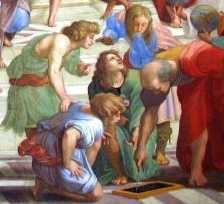Sol, ecce, lentus óccidens
Behold, the sun slowly dying
montes et arva et aéquora
over mountains and fields and plains
mæstus relínquit, innovate
leaves them sad, renewed
se lucis omen crástinæ,
light is itself a harbinger of tomorrow,
Mirántibus mortálibus
to wondering mortals
sic te, Creátor próvide,
so provide Thou, Creator,
leges vicésque témporum
laws and alternations of the times
umbris dedísse et lúmini.
you have given shadows and lights.
Ac dum, tenébris æthera
and as long as, the skies of darkness
siléntio preméntibus,
overwhelmed by silence
vigor labórum déficit,
the liveliness of labors flag,
quies cupíta quæritur,
desired quiet is sought after
Spe nos fidéque dívites
we with the riches of hope and faith
tui beámur lúmine
let us be blessed by means of your light
Verbi, quod est a saéculis
of the Word, who from ages past
splendor patérnæ glóriæ.
is the brilliance of the Father's glory.
Est ille sol qui nésciat
He is that Sun which knows not
ortum vel umquam vésperum;
any sunrise or evening;
quo terra gestit cóntegi,
whom the earth is eager to have hidden
quo cæli in ævum iúbilant.
whom the heavens rejoice in for all time.
Has nos seréna pérpetim
we these bright continually
da luce tandem pérfrui,
grant that by light at length we may completely enjoy,
cum Nato et almo Spíritu
with the Son and the nuturing Spirit
tibi novántes cántica. Amen.
renewing the song to you.
OK this one was a watershed for me, not because I think I nailed the translation (I am still unsure of a lot of it) but because the search for help led me to discover something very surprising about this and other hymns I have struggled with.
This hymn is of recent origin. It was not (as I imagined) penned by some monk of past centuries, just past decades. It is the work of Dom Anselmo Lentini of Monte Cassino, presumably the editor of the Liber Hymnarius. He died in 1989. Many of the hymns I have been struggling with are by him. I have struggled mostly because the hymns are not ancient and so there are not ten or twelve translations which have accrued through the ages for me to cheat and look them up, like I have been doing with the other hymns.
Fully forty-three hymns in the Liber Hymnarius are works of Fr. Lentini.
There is a lot more to read about this here at the Musica Sacra forum. It seems that around the beginning of this year, someone there asked about singing the post Vatican II Divine Office. The responses, especially the ones by William Mahrt himself (the president of CMAA) led to the revelation about Lentini writing these Latin hymns, admittedly in a medieval style. Many of the people there have a definite preference for the Pre- Vatican II Divine Office, especially if you want to sing it as a ceremonial in a parish, cathedral or oratory. It's not just nostalgia either, there are historical reasons about how the new LotH was structured, and the (ostensible) assumed intentions of the Reformers (Bugnini especially). They have concluded that the modern LotH was composed for private recitation and not really ever intended to be sung by groups, despite what the introduction to that Breviary says about itself!
Incidentally I was led to this by finding a Catalan translation of this hymn here , which I then put through one of those free automatic translators. The result was suprisingly coherent:
The sun, dying slowly,
it leaves mountains, fields and seas with sorrow;
but he renews the appointment
of the light of the following day.
Thus, Creative oh proseer,
you have fixed, with admiration of the mortals,
the laws and the alternation of the times
between the light and the darkness.
When the darkness submerges
the space in the silence,
the vigor of the works declines
and one looks for the wished rest.
And we, rich people for the faith and the hope,
we enjoy the light of your Verb,
that it is from always
shining of the glory of Pare.
This is the sun
that it never has dawn nor lay;
the earth, with pleasure, wants it to cover it
and the skies praise it eternally.
Grant us, Pare, that finally
we can enjoy this serene light forever;
as long as we renew the canticles of praise to you,
to the Son and to the Saintly Spirit. Amen.
This has all been a real revelation. I never dreamed I would learn so much when I started this project.
Daily Rome Shot 1537
-
Interior of San Nicola in Carcere, in which Card. Burke is celebrant and I
am the deacon… fitting, since I was ordained a deacon in this church.
Meanwhile…...
7 hours ago

No comments:
Post a Comment